
Pacific Journal of Optimization
Scope & Guideline
Empowering Research Through Optimization Insights
Introduction
Aims and Scopes
- Optimization Theory and Algorithms:
The journal emphasizes the development of new algorithms and theoretical frameworks for solving various optimization problems, including convex and non-convex optimization, variational inequalities, and complementarity problems. - Applications of Optimization in Engineering and Data Science:
There is a strong focus on applying optimization techniques to real-world problems, particularly in engineering disciplines, data analysis, and machine learning. This includes applications in control systems, image processing, and resource allocation. - Advanced Mathematical Structures in Optimization:
The journal explores optimization problems within complex mathematical structures such as tensors, quaternion matrices, and dual quaternion optimization, providing unique contributions to both theoretical and applied aspects of these areas. - Statistical and Stochastic Optimization:
Several papers focus on stochastic optimization methods and their applications, highlighting the journal's aim to address uncertainty in optimization problems through robust and adaptive strategies. - Multi-objective Optimization:
The journal features research on multi-objective optimization, exploring methods to simultaneously optimize multiple criteria, which is crucial in fields such as economics, engineering, and decision-making.
Trending and Emerging
- Quaternion and Tensor Optimization:
Recent publications show a significant increase in research on quaternion and tensor optimization, indicating a growing interest in these advanced mathematical frameworks for solving complex problems across various disciplines. - Data-Driven and Machine Learning Optimization:
There is a notable trend towards integrating optimization techniques with machine learning, focusing on data-driven approaches that leverage large datasets for improved decision-making and predictive modeling. - Robust and Adaptive Optimization Techniques:
Research on robust optimization methods that account for uncertainties and variabilities in data is on the rise, reflecting a need for more resilient solutions in practical applications. - Multi-criteria Decision Making:
An increasing number of papers are addressing multi-objective optimization problems, indicating a shift towards more comprehensive decision-making frameworks that consider multiple conflicting objectives. - Numerical Methods and Computational Efficiency:
A trend towards enhancing computational efficiency through innovative numerical methods is evident, with researchers focusing on algorithms that reduce computational complexity while maintaining solution accuracy.
Declining or Waning
- Classical Optimization Techniques:
Traditional optimization methods, such as simple gradient descent or basic linear programming approaches, are appearing less frequently as the focus shifts towards more complex and specialized algorithms that handle non-convexity and high-dimensional data. - Deterministic Optimization Models:
There is a noticeable decrease in publications centered around deterministic models, as the community increasingly recognizes the importance of stochastic and adaptive methods in dealing with real-world uncertainties. - Basic Statistical Methods:
Research utilizing basic statistical methods in optimization, such as simple regression models, has waned, possibly due to the rise of more sophisticated data-driven approaches that integrate machine learning and advanced statistical techniques.
Similar Journals
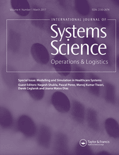
International Journal of Systems Science-Operations & Logistics
Driving Excellence in Logistics and Management ResearchInternational Journal of Systems Science-Operations & Logistics, published by TAYLOR & FRANCIS LTD, stands as a leading platform for the dissemination of high-quality research in the fields of operations science, logistics, and systems management. With an ISSN of 2330-2674 and an E-ISSN of 2330-2682, the journal is recognized for its rigorous peer-review process and its commitment to advancing theoretical and practical insights in the discipline. As of 2023, the journal proudly holds Q1 rankings in Information Systems, Information Systems and Management, and Management Information Systems, demonstrating its significant impact within the academic community. Additionally, it ranks within the top 20% of journals in categories such as Management Science and Operations Research and Decision Sciences. Researchers and professionals in the fields of management and logistics will find the journal invaluable for accessing cutting-edge research that addresses contemporary challenges. The journal’s diverse scope and relevance to real-world applications ensure it remains an essential resource for scholars and practitioners alike. With a converged publication timeline from 2014 to 2024, it continues to play a pivotal role in shaping discussions and innovation in systems science.

Opsearch
Advancing Knowledge in Computer Science and Operations ResearchOpsearch is a distinguished journal published by Springer India that serves as a vital platform for researchers, professionals, and students in the dynamic fields of Computer Science Applications, Information Systems, Management Information Systems, and Management Science and Operations Research. Since its inception in 2009, it has been dedicated to disseminating innovative research findings and practical applications that contribute meaningfully to the evolution of these disciplines. With its notable positioning in the Q2 and Q3 quartiles in various categories, Opsearch boasts a robust reputation with Scopus rankings placing it competitively within the fields it represents. While currently not an Open Access publication, the journal is committed to ensuring that the research it publishes is accessible to an extensive audience through libraries and institutional subscriptions. The journal's overarching objective is to foster knowledge exchange and interdisciplinary collaboration, making it an indispensable resource for advancing theoretical and operational research.
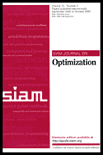
SIAM JOURNAL ON OPTIMIZATION
Transforming ideas into impactful optimization methodologies.SIAM Journal on Optimization is a prestigious academic journal published by SIAM Publications, dedicated to advancing the field of optimization within applied mathematics, theoretical computer science, and software. Since its inception in 1991, the journal has maintained a rigorous commitment to publishing high-quality research that drives innovation and application in optimization theory and methodology. With a significant impact factor and currently ranking in the Q1 quartile across various academic categories, the journal serves as an essential platform for researchers, professionals, and students aiming to contribute to this dynamic field. Although it does not currently offer open access, the journal's robust reputation and extensive reach make it an invaluable resource for those looking to stay at the forefront of optimization research. Based in Philadelphia, PA, this journal plays a crucial role in disseminating pivotal findings that enhance both theoretical understanding and practical applications of optimization in diverse domains.
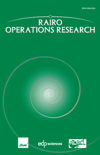
RAIRO-OPERATIONS RESEARCH
Empowering decision-making with cutting-edge operational methodologies.RAIRO-Operations Research is a distinguished journal published by EDP Sciences S A, focusing on the intricate fields of operations research, management science, and computer science applications. Established in 1977, this French-based journal encompasses a rich legacy of contributing to theoretical advancements and practical applications that equip researchers, professionals, and students with the insights necessary to navigate complex decision-making environments. With a notable Scopus ranking in various categories, including a Q3 position in Computer Science Applications, Management Science and Operations Research, and Theoretical Computer Science, the journal aims to foster innovation and share impactful research findings. As an insightful platform, RAIRO-Operations Research is essential for those seeking to deepen their understanding and enhance their expertise in operational methodologies, while also offering a range of access options for its wide readership. Delve into the journal to explore transformative research that pushes the boundaries of operations research.
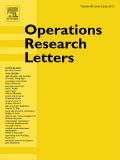
OPERATIONS RESEARCH LETTERS
Connecting Theory and Practice in Operations ResearchOperations Research Letters, published by Elsevier, is a premier journal dedicated to fostering the development and dissemination of innovative research within the field of operations research. With an ISSN of 0167-6377 and an E-ISSN of 1872-7468, this journal has been a vital resource since its inception in 1981, and it continues to publish cutting-edge research through 2024. Positioned in the category quartiles Q2 and Q3 across relevant disciplines—including Applied Mathematics, Industrial and Manufacturing Engineering, Management Science and Operations Research, and Software—this journal provides a crucial platform for scholars and practitioners to explore theoretical advancements and practical applications. The journal is particularly significant for those engaged in the inter-disciplinary challenges of optimizing complex systems, highlighting its importance in driving forward both academic inquiry and industry practice. Researchers, professionals, and students can benefit from the insights presented in its pages, contributing to informed decision-making and strategic innovations in operations research.
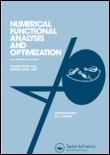
NUMERICAL FUNCTIONAL ANALYSIS AND OPTIMIZATION
Pioneering solutions for complex problems in analysis and optimization.NUMERICAL FUNCTIONAL ANALYSIS AND OPTIMIZATION, published by Taylor & Francis Inc, is a premier international journal dedicated to advancing the fields of analysis, optimization, and applied mathematics. With its ISSN 0163-0563 and E-ISSN 1532-2467, this journal has established itself as a vital resource for researchers and practitioners seeking to explore innovative methodologies and applications. Covering a broad spectrum of topics intersecting mathematical analysis and computer science, it has consistently ranked in the Q2 tier for Analysis and Control and Optimization categories and is well-regarded in the communities of Signal Processing and Computer Science Applications. The journal's commitment to publishing high-quality research ensures significant contributions to solving complex problems in various fields, making it an essential reference for students, academics, and industry professionals. With a publishing history dating back to 1979, it encourages the dissemination of groundbreaking ideas and practical methodologies, fostering a collaborative academic environment. Access to the published articles may vary, so contributors and readers are encouraged to engage with the latest findings and ongoing research through the journal’s platform.

JOURNAL OF GLOBAL OPTIMIZATION
Elevating Optimization Research to New HeightsJOURNAL OF GLOBAL OPTIMIZATION, published by Springer, is a premier academic journal dedicated to the intricate and multidisciplinary fields of optimization theory and its applications. Established in 1991 and continuing to publish until 2024, this journal has solidified its reputation as an essential resource for researchers and practitioners in Applied Mathematics, Business Management, and Computer Science, amongst others, securing respectable Q2 Quartile rankings across various categories including Control and Optimization and Management Science. With recognized contributions reflected in its Scopus rankings — such as being positioned in the 72nd percentile for Applied Mathematics — the Journal of Global Optimization is committed to disseminating rigorous research that advances both theoretical foundations and practical implementations. Although it does not currently offer Open Access options, the journal amplifies insights into optimization challenges in a global context, making it indispensable for those striving to push the boundaries of knowledge in this dynamic domain.

CYBERNETICS AND SYSTEMS ANALYSIS
Innovating Connections in Cybernetics and Systems AnalysisCYBERNETICS AND SYSTEMS ANALYSIS is a distinguished journal published by Springer, focusing on innovative research and developments in the fields of cybernetics, systems analysis, and their applications within computer science. With an ISSN of 1060-0396 and E-ISSN of 1573-8337, this journal serves as a critical platform for disseminating groundbreaking ideas that drive advancements in computational theories and practices. Although it operates under a subscription model, the journal is highly regarded with a Q3 ranking in computer science, as of 2023, highlighting its relevance in the academic community. Covering a broad scope from the convergence years of 1991–2001 and 2003, and extending its reach from 2005 through 2024, CYBERNETICS AND SYSTEMS ANALYSIS plays a pivotal role in fostering dialogue and collaboration among researchers, professionals, and students, aiming to merge theory with practical applications in cybernetics and systems thinking.

Set-Valued and Variational Analysis
Empowering Researchers with Open Access Mathematical InsightsSet-Valued and Variational Analysis is a distinguished journal published by SPRINGER, focusing on the intersection of mathematical analysis, applied mathematics, geometry and topology, numerical analysis, and statistics and probability. With an impressive impact factor reflecting its relevance and citation frequency in the academic community, this journal has consistently maintained a Q1 ranking in multiple categories as of 2023. Serving an international readership, it offers invaluable contributions to the theoretical and practical aspects of mathematics and supports the dissemination of cutting-edge research and methodology in the field. The journal operates on an open access model, ensuring that groundbreaking findings are readily accessible to researchers, professionals, and students alike. Since its inception in 2009, Set-Valued and Variational Analysis stands as a pivotal platform for advancing knowledge in diverse mathematical disciplines and fosters collaboration across various fields of study.
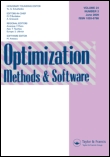
OPTIMIZATION METHODS & SOFTWARE
Pioneering Research in Optimization Techniques and Software SolutionsOPTIMIZATION METHODS & SOFTWARE, published by Taylor & Francis Ltd in the United Kingdom, is a premier journal dedicated to the field of optimization and software development. With an impressive impact factor, this journal maintains a critical role in advancing research in applied mathematics, control, and optimization, as evident from its categorization in the prestigious Q1 quartile for both applied mathematics and control and optimization, and Q2 in software for the year 2023. Over its publication span from 1992 to 2024, it has garnered significant recognition, ranking #116 out of 635 in applied mathematics and #29 out of 130 in control and optimization according to Scopus. The journal provides a platform for innovative research outcomes, theoretical advancements, and novel algorithms that aid researchers, professionals, and students in tackling complex optimization problems. Whether you are looking to disseminate your latest findings or explore cutting-edge methodologies, OPTIMIZATION METHODS & SOFTWARE remains an invaluable resource in the field.